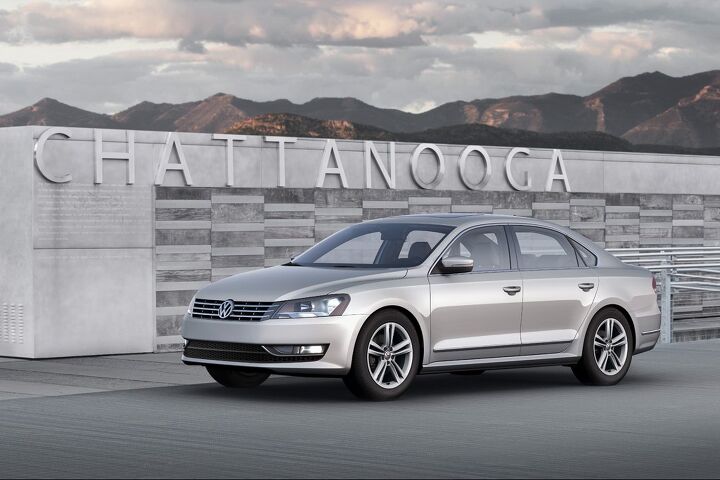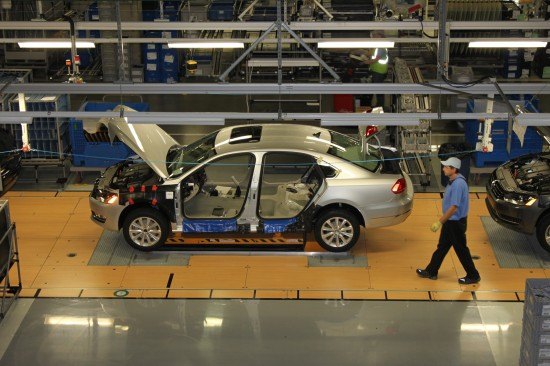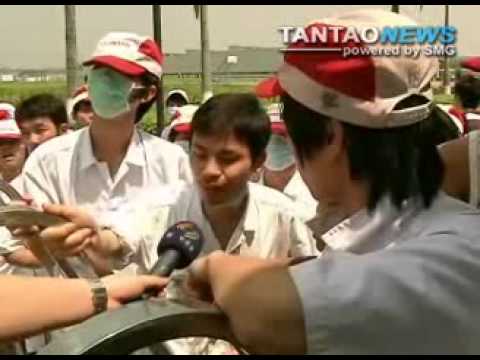#Jobs
Volkswagen Bulks Up Chattanooga Plant
For the second time this year, Volkswagen is increasing headcount at its Chattanooga plant. After hiring 200 new workers in January, Volkswagen now created an additional 800 new jobs.
Volkswagen Chattanooga: We Hire
The line at Volkswagen’s Chattanooga plant will run a little faster. It will produce 35 cars instead of 31 per hour. That also produces new jobs. In an emailed statement, VWoA announced today that 200 new permanent jobs will be created at its Tennessee plant.
Opel Turns 150, Commences Cutting
Ever since Steve Girsky an his “merry band of hatchet men” touched down in Rüsselsheim, Bertel has been warning that GM’s European division was about to embark on a serious cutting binge. But our worst fears, namely that Opel could go away entirely, have yet to be realized. Instead it seems that self-destructive mutilation will be attempted first, in order to stem the gushing red ink at Opel where at least €1b in losses are expected next year. Automotive News Europe [sub] reports that the first round of cuts will hit Opel’s Internationalen Technischen Entwicklungszentrum (ITEZ, “International Technical Development Center), as an IG Metall union document foresees some 1,420 product development position cuts (from a staff of some 6,000).
UAW Backs Off Transplant Organizing Goal, Attacks Hyundai
At the beginning of this year, the United Auto Workers pledged that it would launch a campaign to organize the foreign-owned, non-union “transplant” factories in the US, threatening to tar uncooperative automakers as “human right abusers.” The campaign initially lost steam, but the UAW stuck to its pledge, re-iterating on several occasions that it would organize “at least one” transplant factory by the end of 2011. With one month left to accomplish that goal and no signs of progress in sight, the UAW has officially called off that goal. In fact, the UAW now hopes to simply pick an automaker to target by the end of 2011. Spokeswoman Michelle Martin tells Bloomberg
At this point, our hope is to make a decision about who we’re going to target by the end of the year. But obviously, we won’t have the organizing campaign completed by the end of the year.
This is not too surprising, considering the UAW announced last week that it would be focusing on dealership pickets initially rather than factory organizing. And sure enough, the first dealership picket has begun, targeting Hyundai dealerships. And yet, says Martin
This has nothing to do with the domestic organizing campaign. Hyundai is not the target.
Huh? If the UAW is not committing to organizing Hyundai’s assembly workers, why picket Hyundai dealerships?
Is Fiat Considering A Pullback From Italy?
As the world struggles to come to grips with economic uncertainty, Bertel has been reporting that Japanese automakers are abandoning their homeland for lower-cost production centers overseas. Now, with economic turmoil shifting to Europe, it seems that Fiat could possibly be preparing for a pullback from Italy. Two basic factors are driving Fiat towards reconsidering its global manufacturing footprint: first, its struggles in the European market where margins are slim and dropping, second, its battles with Italian unions. Though Marchionne’s latest comments are ambiguous at best, some see these factors pushing the Italian automaker away from the market that gave it birth.
UAW: The War On Transplants Is Still On, Dealers On The Front Lines
With a tough negotiating session with its traditional employers now complete, the United Auto Workers are turning their focus back to the year’s primary goal: organizing the transplant factories. 2011 was supposed to be the year in which the UAW took down “at least one” foreign-owned auto plant, with the union’s boss even going as far as to say
If we don’t organize the transnationals, I don’t think there is a long-term future for the UAW
But as we found, the UAW is not welcome in the South, where most of the transplant factories are found. And with Honda, Hyundai, Toyota and VW all rejecting the UAW’s advances in some form or another, the union’s options are fairly limited. So instead of taking on the factories directly, the UAW is bringing back a questionable tactic from the days when it was misleadingly bashing Toyota for “abandoning” the NUMMI factory: they are taking the fight to dealerships.
UAW: Government Was Not Involved In Negotiations After All
In a newsletter to members of Local 598, an editor revealed an interesting wrinkle in the recently-ratified contract negotiations, writing
With the option of strike off the table and the government still a part of our negotiations (literally sitting in the room with us ‘observing’ our talks), I don’t believe any better agreement could have been reached,
But now, reports Bloomberg [via Automotive News [sub]], local shop committee person Dana Rrouse insists that there was not actually a government official present at union negotiations. He tells the news service
That was a misprint. I didn’t get to proofread it. It went out and then I said ‘Where did you get that from?’ I mean, I talked about us still being under government, but nothing as far as they were sitting there.
The government still owns a large portion of GM’s stock, but it too says it was not involved with negotiations with the UAW. Which is probably the right position to be taking: with so much acrimony generated by the latest round of negotiations, there are few reasons to be associated with them. Still, it’s strange that such an explosive “misprint” should have made its way into a union newsletter. Even if the government were not involved in the slightest, as it insists it was, there’s clearly a perception among UAW members that the government remains a consistent presence in the auto industry.
Opel: With Cuts Possible, Union Boss Faces Heat
From his dream of a UAW-represented VW plant in Tennessee ( ha!) to his desire for a seat on the boards of the Detroit automakers ( double ha!), UAW President Bob King has a way of idealizing the German unions. And no wonder: while the UAW spent decades fostering a radical sense of entitlement, German works councils entwined themselves with their respective employers, earning places of power among the world’s largest automakers. But unions are a delicate balancing act in every country and culture, and even Germany’s unions, widely hailed as the example for the industry, can run into trouble.
Last time it was Volkswagen’s powerhouse works council, which erupted in a scandal over VW-funded sex tourism (with free Viagra and shopping trips for the wives!) back in 2005. With Opel’s union boss, Klaus Franz, becoming caught up in his own (slightly less lurid) scandal, GM’s acknowledgment that more cuts could be coming for Opel could prove just as explosive for the German works council model.
UAW Group Files Grievance Against Chrysler Contract
Despite UAW President Bob King’s insistence that the UAW is not riven with divisions, Chrysler’s latest union contract is inflaming intra-union conflict, as the Detroit News reports that the Autoworker’s Caravan splinter group is protesting the union’s decision to approve a contract despite being rejected by Chrysler’s skilled trade workers. According to Autoworkers Caravan’s Alex Wassell,
We voted down the tentative agreement. But they used a procedural loophole to ratify it. We think it’s a very bad agreement and a very bad precedent, and we’re going to do everything we can to overturn it.
Bob King Defends UAW Contract Priorities
Watch UAW President Bob King on New Contracts: Top Priority Was Creating Jobs on PBS. See more from PBS NewsHour.
Though UAW boss Bob King has said that organizing transplant factories is a life-or-death struggle for the union, but the real make-or-break issue this year was the contract negotiations with the Detroit Automakers. And though King roundly denies that a rift has been formed in his union over two-tier wages, the facts simply don’t back that position up. In the last contract to be ratified (with Chrysler) for example, only 54.8% of the union approved the deal… hardly the “overwhelming support” that King claims. Moreover, 55.6% of the skilled-trades workers at Chrysler rejected the contract, according to the Detroit Free Press. King’s narrative of experienced workers “demanding” higher wages for the Tier Two brothers “in the greatest spirit of solidarity” just doesn’t hold up to scrutiny.
Obama And Lee At Orion: Free Trade Sucks, But It Beats The Alternatives
GM: Volt Second Shift Delayed, 60k Global Units Still Planned For 2012
The Chevrolet Volt may be beating cars like the Jaguar XF and the Lincoln MKT in the sales race, but GM won’t come close to building 120,000 of the plug-ins next year as the Department of Energy was expecting. Today GM confirmed to Automotive News [sub] that it will make 60,000 Volts next year… and it will do so while remaining on a single shift. GM had previously planned to add a second shift at the Det-Ham plant late this fall, but is putting that off until midway through next year, when production of the ’13 Malibu begins there. Until then, The General is adding 300 workers to the 10-hour, four-days-per-week single shift, a move the company says
will significantly reduce costs, and has no impact on the plant’s ability to make 60,000 Volts and Amperas (the European version of the Volt) in 2012.
Think 60,000 units is still more Volt than America will buy? Well, you’re right so far, but 15,000 of those will be exported to Europe, so GM only has to sell 45,000 US-market Volts next year. Although considering the Volt won’t crack 10,000 units this year, that’s still some strong projected growth. And as usual, the union local President sums up the situation with more candor than any executive would:
The sooner the better, but I guess demand will dictate when that happens. Hopefully we’ll get a third shift someday, too.
Sergio Marchionne: International Union-Buster
Considering the United Auto Workers’ VEBA fund is still Chrysler’s second-largest shareholder, CEO Sergio Marchionne is taking an amazingly hard line with the union. With a GM deal long done, and Ford’s deal moving towards approval, Chrysler is the last automaker on the UAW’s to-do list… and Marchionne tells Bloomberg he’s up for a fight if necessary, saying
I sincerely hope that we don’t have to get to arbitration. But if necessary, Chrysler will go there. We and GM are completely different
Marchionne is reportedly pushing the UAW for a number of tough concessions, including a mere $3,500 signing bonus (compared to $5k at GM and a reported $6k at Ford), and the elimination of a planned 2015 cap on entry-level “Tier Two” workers (at 25%). And though both of these are tough asks, he’s using UAW boss Bob King’s concept of union internationalism as a cudgel against the UAW, playing Italian unions off their American counterparts. And as a result, he could earn Chrysler a favored place among America’s unionized autoworkers.
Is China's Cheap Labor A Thing Of The Past?
The prospect of a Chinese auto industry growing at insane speed thanks to a booming market and resiliently low wages has long kept auto industry execs up at night, most notably inspiring Sergio Marchionne’s acquisition of Chrysler. But basic economic principles dictate that you can have a high rate of growth or low wages… but not both. Growth inevitably drives inflation, which drives up wages, which in turn slows growth. And according to a report in the Wall Street Journal [sub], that dynamic is already taking hold.
Jae-Man Noh, head of Hyundai’s joint-venture operations in China, said average manufacturing-worker wages in China—about 27,000 yuan ($4,200) a year per worker in 2009—are likely to double by 2015 from current levels.
Auto makers are expected to be affected as much as other industries by the trend, if not more, Mr. Noh said, adding that wage costs for many foreign auto manufacturers already have doubled in less than a decade. He said that a rival foreign auto maker that Hyundai has researched has seen worker wages in China rise to 49,000 yuan a year per worker in 2010, up from 24,500 yuan a year in 2003.
“We need to let go of our perception that the Chinese market is a low-cost production base,” Mr. Noh told a group of reporters at Hyundai’s office in Beijing. He didn’t offer specifics on Hyundai’s wage costs in China.
And though the laws of supply and demand made this development inevitable, the story of the decline of China’s low-wage manufacturing base is a lot more interesting than you might think. After all, economic and historical forces may seem mechanical in the abstract, but on the ground level they work in dramatic, disruptive ways.White House Delays CAFE Announcement As Jobs, Downsizing Achievments Come Under Fire
Though the Obama Administration has announced the broad outlines of its 2017-2025 CAFE standard, the final rule wasn’t supposed to be released until the end of this week… and now, according to Reuters, it is delaying that release until mid-November. According to Reuters
The administration would, with a short delay, remain on track to meet its deadline for issuing final rules next July, five years before they take effect. That timeline gives the industry room to plan its vehicle mix and make any production or technology changes…
But sources familiar with the matter said the work is complex and time consuming. Regulators, they said, are purposely moving slower than anticipated to ensure that industry, environmental and consumer issues likely to be raised during a lengthy public comment period are addressed ahead of time.
Regulators also want to make sure the proposal can clear the White House budget office, which reviews proposed regulations, in a timely fashion.
But even as regulators work to anticipate criticisms of the new standard, more criticisms are materializing. From the mitigating impact of loopholes added late in the process to the regulation’s effect on jobs, the CAFE criticisms are stacking up.





















Recent Comments